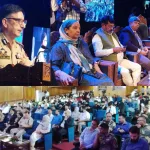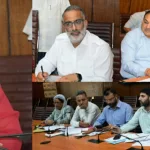Srinagar, Feb 21: In a big relief to Anganwadi workers who are working across J&K, the High Court of Jammu & Kashmir and Ladakh directed the government to fix their seniority on the basis of their initial engagement in tune with the rules governing the field.
The court while quashing Clause-1 incorporated in government order issued on February 28, 2019, directed the government to fix the seniority of Anganwadi Workers on the basis of their initial engagement as Anganwadi Workers in tune with the J&K Social Welfare (Non-gazetted) Service Recruitment Rules of 1991 read with Rule 24 of the J&K Civil Service (Classification, Control and Appeal) (CCA) Rules of 1956.
Justice Javed Iqbal Wani passed the directions in a bunch of petitions filed by Anganwadi workers challenging Clause-1 of the government order issued in February 2019 relating to the selection of Anganwadi Workers as Supervisors.
As per the Clause-1 of the order, the seniority of the Anganwari Workers, who have acquired higher qualification (Graduation) during service shall be taken from the date of acquiring the higher qualification instead of the date of their initial appointment.
However, the petitioners contended that the seniority of the Graduate Anganwari Workers is to be reckoned from the date of their initial appointment as provided under Rule 24 of CCA Rules.
Justice Wani underscored that in terms of Rules of 1991, the post of Anganwari Workers is identified as one class under Clause-III and does not make any distinction on the basis of educational qualification as such.
“It being so, a common seniority list of all Anganwari Workers, notwithstanding any disparity of qualification, is required to be maintained on the basis of the initial engagement and irrespective of the date on which any Anganwari Worker acquires Graduate qualification, and therefore undertaking any process of maintaining a separate seniority for both Graduates and Matriculate Anganwari Workers on the basis of acquiring higher qualification would be contrary to the Rules,” the court said.
The bench held that formulation of principles for fixation of seniority, promotion and determination of seniority are matters of policy which may find expression either in statutory rules or administrative orders including executive instructions.
The court ruled that when a particular field is occupied by statutory rules then the administrative orders or executive instructions cannot be issued to nullify the effect or impact of the statutory rules.
The court further held that if there is a conflict between a statutory rule and an administrator order, the rule has to prevail and the administrative order/executive instruction has to give way to the statutory rule if both occupy the same field.
Justice Wani said that that the statutory rules of 1991 occupy the field insofar as determination and fixation of seniority of Anganwari Workers is concerned and in presence of said rules, “the impugned Clause under challenge pales into insignificance and the same cannot therefore sustain as being contrary to the mandate of said rules.”
Relying on a Supreme court judgment in a case titled ‘Viman Vaman Awale Vs. Gangadhar Makhriya Charitable Trust and others’, the court recorded that it was observed that acquisition of higher qualification at a later date, even when such a higher qualification is the requisite qualification for the higher post, will not be determinative for fixing the seniority.
The bench noted that the Clause incorporated in government order is contrary to the Rules of 1991 read with Rule 24 of CCA Rules of 1956, thus not in conformity with law on the principle laid down by the Apex Court in the aforementioned judgment that the seniority to a particular class, category or cadre cannot be counted and fixated on the basis of acquiring a higher qualification which may be relevant or beneficial for speedy promotion, but has to be on the basis of the date of initial appointment.
“However, for the purpose of computing the experience with a particular qualification, the relevant date would be when a relevant qualification has been acquired. Previous experience without particular qualification will have to be ignored, the court said while allowing the pleas.





